To the people of Warrington, he was a baby who was very much loved and never to be forgotten.
From the school children who emptied their piggy banks to help pay for his funeral to the mothers who tended his grave under the shade of a towering beech tree, and even to the rookie police constables on the first rung of their career ladder, the name Baby Callum always stirred certain feelings, unique to this close-knit Cheshire community.
For more than 25 years he was their little ‘unknown warrior’. A newborn baby smothered after taking his first breaths, someone had wrapped his tiny body in bin bags and dumped him in the woods, close to a children’s theme park.
The only clues to his identity lay in his DNA, but, despite an extensive investigation in which police questioned hundreds of young women, took swab samples from teenage girls at three high schools, and made repeat appeals in the months and years that followed, his mother was never traced.
Until two years ago that is, when, following a combination of painstaking, old-fashioned police work and an advancement in DNA science, the breakthrough finally came.
At exactly 3.10pm on Friday March 24, 2023, an email dropped into the inbox of two female detectives at Cheshire Constabulary, with the subject line: Are You Sitting Down?
‘It was an amazing moment, we just stood up in the office and hugged each other, we couldn’t believe we had done it,’ recalls Detective Inspector Hannah Friend, who by then had worked on the cold case for more than a year.
‘So many officers had looked at this case over the 25 years, it had become one of those that was almost legendary in the force.
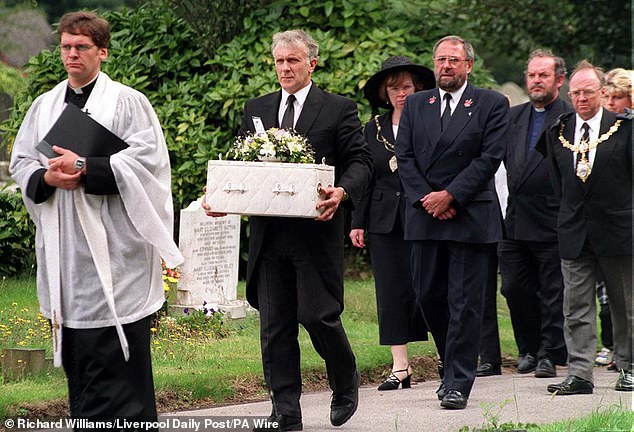
The funeral procession for Baby Callum at St Elphin’s Church in Warrington
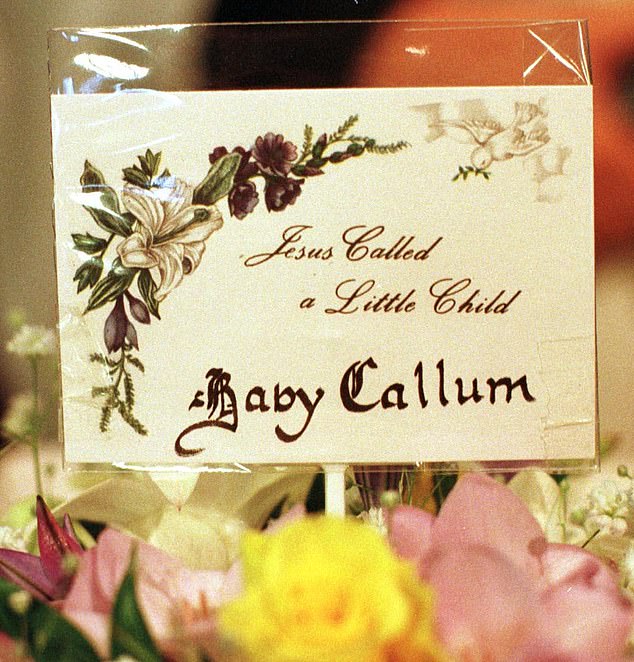
The child was named Callum after being found in the Callands area of the town
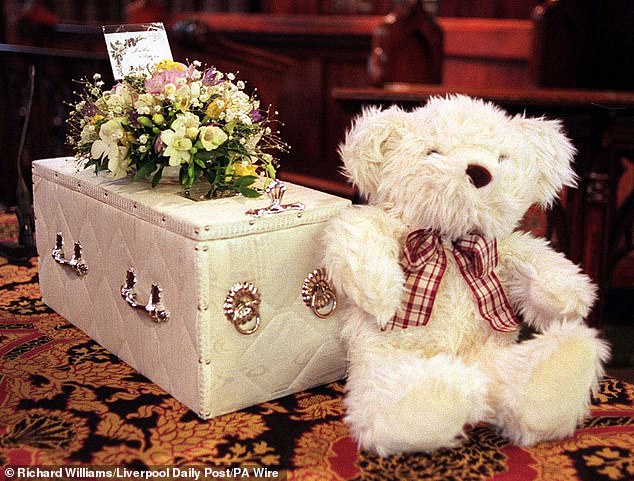
His death and discovery brought the community together, with residents from all walks of life contributing to fund the funeral
‘I even remember as a young, probationary officer my tutor telling me about it. Baby Callum was one of those stories that got passed down. So to finally solve it was amazing.’
Named Callum by police after the suburb of Callands where he was found on March 14, 1998, everyone had always assumed he’d been killed and dumped by a scared, unmarried teenage girl. But the truth was much more perplexing and disturbing, the impact of which, the Mail can reveal, has devastated the baby’s family and sent shockwaves through the whole community once again.
For what forensic scientist Mike Walbank discovered, in his laboratory in Abingdon, near Oxford, was that Callum was a genetic match to a man called Matthew Sharkey, 28, whose details had been uploaded on to the national DNA database when he was arrested for a minor, unrelated offence.
Using public records, the team began piecing together a family tree for Mr Sharkey, to work out his relationship to the baby. It was quickly established that there was a ‘36billion-to-one’ probability that Matthew was Baby Callum’s full, older brother, which inevitably led them to his mother – Joanne Sharkey.
But, contrary to all the predictions of the criminal psychologists profiling the case back in 1998, Sharkey had not been an unmarried teenager. She was, they were shocked to discover, a married woman of 28 who already had a young son but had managed to hide the pregnancy from everyone, including her husband.
Earlier this year, Sharkey, now 55, appeared before Liverpool Crown Court, where she admitted a charge of manslaughter on the grounds of diminished responsibility.
Last month she walked free after the judge, Mrs Justice Jennifer Eady, refused to send her to prison, saying her case called for ‘compassion’. Sharkey wept as she was handed a two-year prison term, suspended for two years, and ordered to undergo treatment for her mental health problems.
Psychiatrists who assessed Sharkey agreed she had been in the grip of severe post-natal depression, following the birth of her first son Matthew, when she fell pregnant a second time, in the summer of 1997.
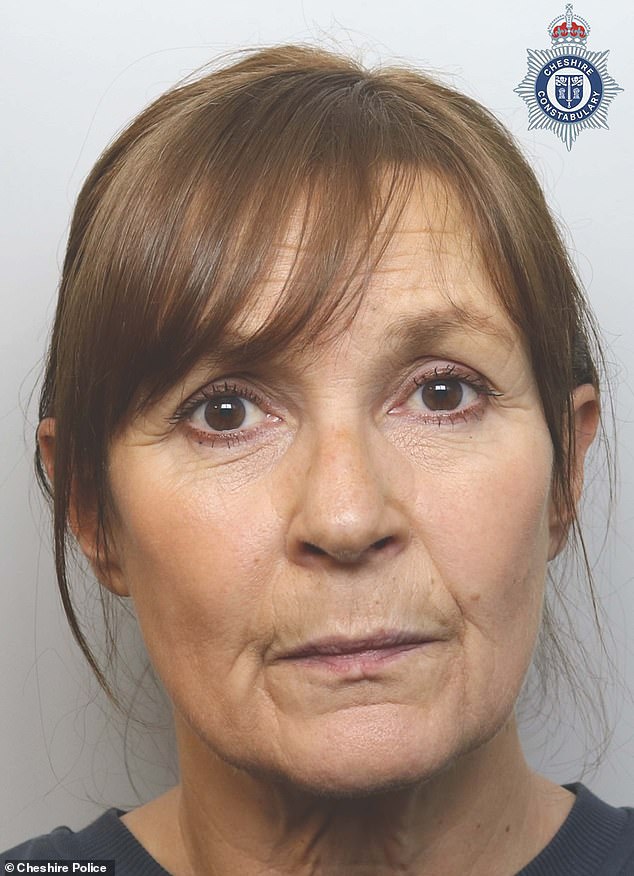
Joanne Sharkey was identified as Callum’s mother around 25 years later
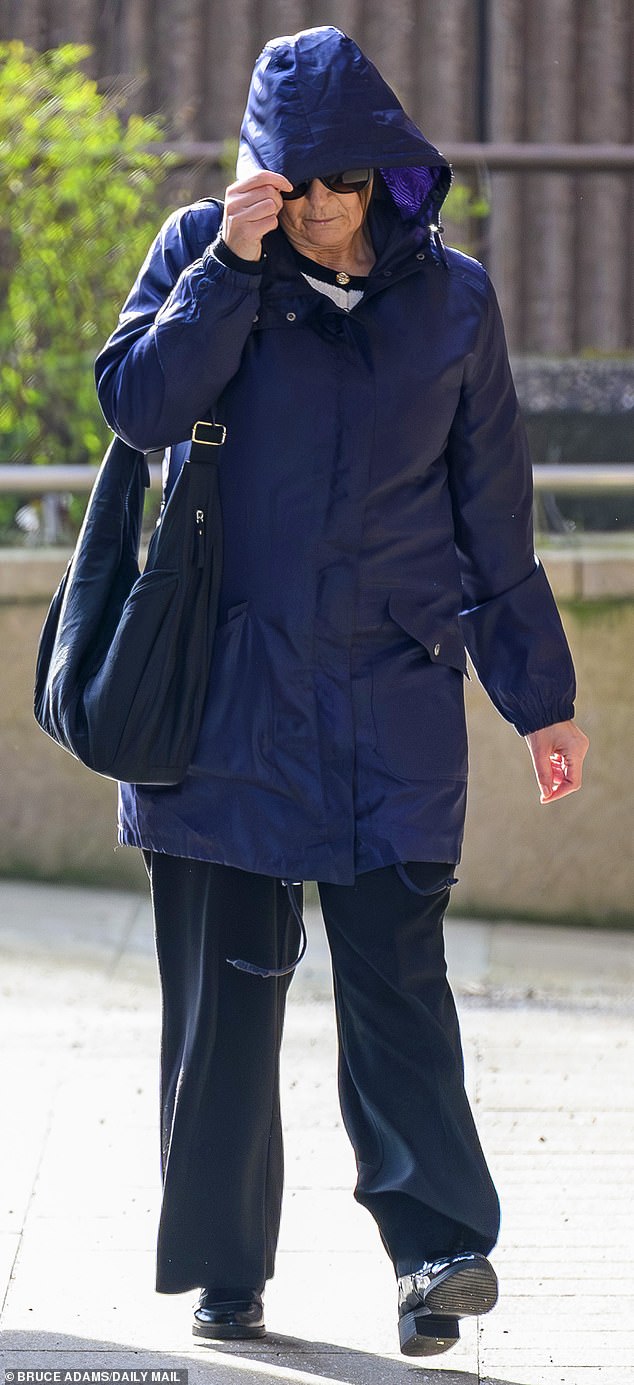
Last month she walked free after the judge said her case called for ‘compassion’
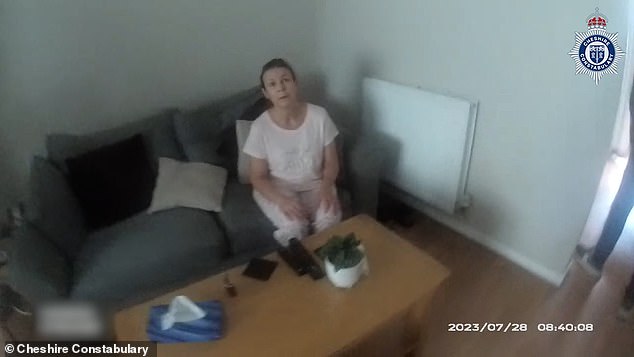
The moment Cheshire Constabulary arrested the 55-year-old
The court heard how, back then, Sharkey had just returned to her full-time job as a housing benefits officer at West Lancashire Borough Council following her maternity leave and was struggling to cope with work and looking after Matthew, who had just turned one.
She became severely depressed and believed she ‘couldn’t do this again’. With her husband working shifts, the couple were like ‘ships in the night’, the court was told, and Sharkey decided not to tell him about the pregnancy. Instead, she tried to ignore it and kept it secret.
As she put on weight, she started wearing baggy clothes and said it was due to overeating at Christmas.
She gave birth alone, in the bathroom of the family’s smart, semi-detached home in Liverpool, three months later.
She claimed to remember little about the ‘quick and easy’ labour but told police officers that when the baby began to cry she ‘just had to make him quiet… I covered his nose, his mouth’.
He was found with wads of tissue in his nose and mouth. She wrapped the baby in two tightly knotted bin bags, then drove to ‘nowhere in particular’, dumping his body in woodland 30 miles away, close to the Gulliver’s World Theme Park in Warrington.
Police bodycam footage filmed after she was arrested and played to the court showed Sharkey insisting Neil, her husband of 31 years, knew ‘nothing about it’.
In a statement read in court, Mr Sharkey, 56, revealed he was sticking by his wife whom he said he’d loved since ‘the first time I saw her’.
He admitted he ‘wasn’t the greatest husband and father’ or the ‘easiest person to live with’ in 1998, and that he blamed himself for what happened. He added that his wife was an ‘amazing mother’ who had single-handedly raised their son.
However, he also admitted her arrest had ‘fractured’ their family ‘to the core’ and the Mail can reveal that, while his side of the family have been supportive, some close relatives on her side have been left so distressed and unable to accept what she has done that they have cut her out of their lives.
A source close to the family, who didn’t want to be named, told the Mail: ‘This has been so upsetting, the whole experience has made me ill. I’m not in touch with her now because of all this.’
Another added: ‘It has all been very difficult.’
The discovery of the body of the unidentified baby boy, by a man out walking with his son and dog, shocked the town.
In the days that followed, Cheshire Constabulary launched a murder investigation, codenamed Operation Wistful, which involved a team of officers contacting hospitals, community midwives and carrying out extensive house-to-house inquiries.
When Mother’s Day arrived eight days later, on March 22, churches held special services and said prayers for the infant, who by then had been named Callum, and appeals were made in newspapers and on the television and radio.
Police were even given permission to take DNA samples from 300 teenage girls at local schools, such was the desperation to solve the mystery.
Shelley McCabe, who was 30 at the time, had two young children and was living in Old Hall, close to Gulliver’s World, when she heard about the sad discovery.
Newly married, she had recently been told by doctors that she and her second husband, Trevor, then 27, would never be able to conceive a child together because of fertility problems – a fact that compelled her to do something to help.
‘I was very upset and depressed at that time,’ she told me. ‘I’d married Trevor the year before and, although he treated my two eldest as his own, I wanted to give him a child. I felt our marriage was incomplete and we were going through a difficult period.
‘So, as soon as I heard the baby’s body had been found, I was straight on to the police to ask what I could do to help.
‘That’s when I became involved in fundraising for the funeral and the headstone. The police said otherwise he would be buried in an unmarked grave and I just couldn’t have that.’
A funeral date was set for July 27, at St Elphin’s Parish Church, and Mrs McCabe, who worked in a supermarket, started a collection, contacting friends, colleagues and local businesses for donations.
‘Kids were emptying their piggy banks and giving over their birthday and Christmas money,’ she adds. ‘It affected the whole community, everyone wanted to do something.’
Reverend Nicky Lees, who was one of three ministers who officiated at Callum’s funeral, said everyone was deeply saddened by the case. ‘I did a lot of work over the months that followed with women who had lost babies,’ she says. ‘I had phone calls from several women. There was one lady in particular who was upset because her baby had been stillborn, others who couldn’t have children – people in the community found it hard. It tugged at their heart strings. It wasn’t an easy time. The poor man who found him, everyone was affected by it.’
Mrs McCabe raised £1,800 towards the service and picked out Callum’s tiny white coffin, which was carried down the aisle by a lone pallbearer to Eric Clapton’s Tears In Heaven – the song the pop star wrote as a tribute to his own young son who had died in an accident a few years earlier.
Around 150 residents attended the 45-minute service, including local schoolchildren who each made cards which they placed on his casket.
He was buried in the shade of a beech tree, next to the grave of another baby boy, in Warrington’s Manchester Road cemetery.
‘It was a very, very sad day because nobody had any answers, nobody knew what had gone on,’ remembers Mrs McCabe.
Rev Lees says: ‘When Callum was found, there was a general feeling of helplessness, but giving him a funeral made people feel better because it meant we were able to do something for him.
‘His final resting place lies next to another baby who had died. I remember his mother was at the funeral and she said, “They’re lying in peace together”, which I thought was very nice. It was a peaceful spot. I went a few times in the weeks and months afterwards.’
His headstone, which was donated by a local stonemason, was engraved with a picture of Jesus as the Good Shepherd and the inscription: ‘Baby Callum, Precious Child of God. With love from the people of Warrington.’
Mrs McCabe also sought solace at Callum’s grave, especially in those early days, as she struggled to accept she wouldn’t be able to have another baby.
But then, she says, a ‘miracle’ occurred. Around that time, she fell pregnant with her third child, Arran.
‘It’s actually a lovely story,’ she says. ‘My son was born on St Patrick’s Day 1999, just a few days after the anniversary of Callum being found. I really believe God was looking down on me.
‘I was meant to help Callum and I was rewarded with Arran. He made our family complete.’
Like the police at the time, Mrs McCabe had always expected Callum’s mother to be a schoolgirl, so she, too, was ‘shocked’ when Sharkey was revealed as the mother.
‘She must have been very poorly to have done what she did. Nobody really knows her circumstances,’ Mrs McCabe says.
Detective Inspector Friend, who had just become a new mother herself when she took on the case, also admits detectives initially ‘wrestled’ with the idea that a husband could be unaware his wife was expecting a baby when they lived under the same roof.
But after questioning the couple separately over many hours, she says: ‘I’m comfortable that that was the case, however unlikely it seems.’
I wonder whether the fact DI Friend had just become a mother and then became pregnant with her second baby while the investigation was still ongoing made her more determined to find out what had happened to Callum.
‘I think anyone with compassion would be driven to solve this,’ she says. ‘The fact that I happened to be pregnant during the investigation was a coincidence, but it perhaps did make it more challenging.
‘I was watching Sharkey being interviewed, listening to her talking about how she’d ended her child’s life and, at the same time, I could feel my own baby kicking inside me… it was a strange dynamic but, ultimately, I’m a professional.
‘The aim for us was to find out who that little boy was, who he belonged to, what had happened to him, who was involved and bring them to justice – and we did that.’
She also accepts the decision to downgrade the charge from murder and concedes that Sharkey’s guilty plea of manslaughter, on the grounds of diminished responsibility, was the right one.
‘On the bare facts she is a woman who killed a baby and hasn’t gone to jail for it,’ DI Friend adds.
‘But as a mother you can’t help but think what that was like, having to live with looking at your other child for 25 years, thinking you should have two sons. There is no worse punishment than that.’












